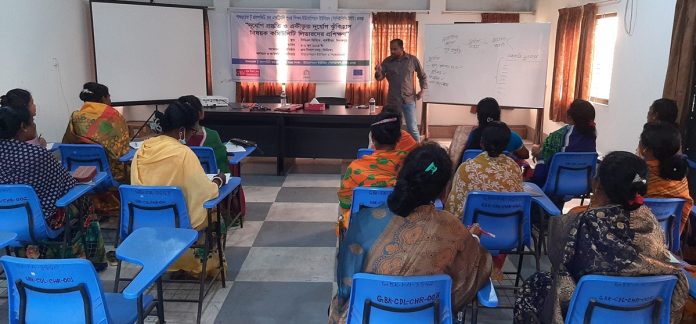The geographic position of Bangladesh on the cusp of the Bay of Bengal to the south, along with its climatic characteristics, poses a significant threat of natural disasters and climatic hazards to its inhabitants. The country has a long and tragic history of being affected by natural calamities, including cyclones, floods, tidal surges and droughts, particularly in its northern and southern regions. These climatic events leave the country with significant scars from mass destruction to lives, livelihoods, and economic growth- cyclone Remal is the most recent example of this.
The PPEPP-EU project implements various activities prioritising disaster management and climate resilience, with a focus on enhancing the knowledge and capacity of the extremely poor population to prepare for and cope with disasters and climate change-related impacts, including establishing connections with various service providers.
In this context, PPEPP-EU organises capacity development training for members of the Cyclone Preparedness Programme (CPP), the Union Disaster Management Committee (UDMC), and the Ward Disaster Management Committee (WDMC) on disaster preparedness and integrated disaster risk reduction.
These trainings aim to provide community leaders with a clear understanding of integrated disaster risk reduction and preparedness, thereby helping them improve their planning and preparation processes for disaster management. The training also emphasises the importance of effective communication with these community leaders and the creation of an enabling environment to enhance the role of local authorities in disaster risk reduction and preparedness for extremely poor households.
PPEPP-EU’s implementing partners in the northern and southern coastal regions, such as Dinajpur, Satkhira, and Bagerhat, have organised a series of capacity enhancement trainings with 385 participants. These trainings, divided into different sessions, focused on PPEPP-EU’s activities regarding disaster and climate resilience, the concept of disaster, integrated disaster risk reduction and preparedness, and the roles of various committees in formulating plans and identifying the responsibilities of community leaders in disaster management and risk reduction.
Meanwhile, every year, PPEPP-EU celebrates National Disaster Preparedness Day on 10 March, engaging its members and local communities to build a safe future for all by raising awareness of reducing disaster risks and the importance of disaster preparedness.
These training sessions and day observations aim to enhance the capacity of community leaders and ensure disaster preparedness among the project’s extremely poor households and their communities, with the support of local authorities and disaster management committees. PPEPP-EU’s capacity enhancement initiatives are expected to play a vital role in promoting integrated disaster risk reduction and preparedness at the local level as community leaders engage in PPEPP-EU’s activities and involve and prioritise project members in their initiatives.


